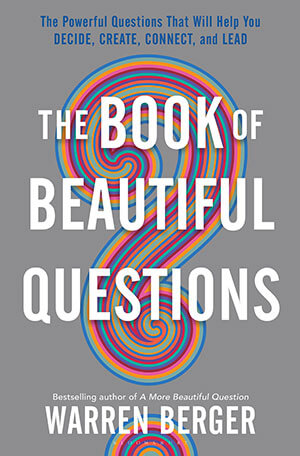Bestselling author Warren Berger has devoted much of his writing career to studying the power of questions, and has written a follow-up book — The Book of Beautiful Questions — to his A More Beautiful Question. In the sequel, he devotes a chapter to exploring why questioning should be a regular practice among leaders. As part of its January cover and CMP Series story, Convene spoke with Berger to learn how servant leadership — leading with humility — is linked to a culture of inquiry.
Leaders are traditionally the ones who provide answers, not ask questions. Is this a bit of a role reversal?
The interesting thing is, I feel like a lot of leaders are into questioning. On some level, they believe in it. They know it’s important. There’s a column that The New York Times runs on Sundays, “Corner Office,” [in which] a chief executive [is interviewed], and they’re always talking about the person’s management and leadership style. And I can’t tell you how many times questioning comes up — probably 50 percent of the time or more, the conversation ends up on the leader saying something like, “I’m a big believer in asking questions. I’m very curious. I try not to make assumptions.” So they already have this belief, this philosophy. But a lot of times they’re not acting on it or they’re not spreading it throughout the organization.
And to do that, I think they have to send a very strong message out to the company: “This is a culture of inquiry we’re trying to build here. And that means questions are great. We want questions.” If you’re a middle manager, you shouldn’t brush off some question that comes from somebody who’s reporting to you. So I think you have to send that message really strongly throughout the organization, and then you may have to develop systems and practices as well.
What might you suggest?
I think that’s up to every company or every organization to figure out for themselves what works best for them. Do we want to have a meeting once a week where we always start the meeting with a question? Or do we want to have some type of a bulletin board where we honor the best question of the week? What are the little things we can do to incentivize questioning? That’s how you build a culture.
It’s not enough to have one good questioner in the company. The idea is you want lots of them. You want lots of people thinking that way — in that open, curious, exploratory kind of mindset.

In his book “The Book of Beautiful Questions,” Warren Berger explores why questioning should be a regular practice among leaders.
In the book, you find fault with a common statement managers make — “Don’t come to me with problems, come to me with solutions.” You say that somebody coming with a question or concern has value in and of itself; you don’t need to force them to come with the question and the solution. That indicates that you’re not interested in that whole messy process of trying to arrive at a solution, right?
Exactly. There’s a really important shift that has to take place where you have to go from thinking of someone asking a question as a distraction or an annoyance, to an opportunity. If someone is asking a good question, that’s an opportunity. That’s an opportunity for the organization to learn something. Within that question may be a possible innovation, if you can answer the question eventually. So you have to look at questions as things that have value in and of themselves. It’s not going to be true, obviously, of all questions. There are going to be times when people ask questions that maybe are off topic or that they are not going to go anywhere. But there are going to be others that are very productive, and that lead to some kind of a change. They lead to people saying, “Hey, wait a minute. We need to rethink a thing we’re doing.” So when that happens, that’s incredibly valuable.
That keeps you from going down the wrong track or following the same routine that you should not be doing anymore.
Related to that is a question you talk about in your book that I thought was great: Am I thinking like a soldier or a scout? Can you give an example of the difference between those two in a workplace environment where you’re trying to build a culture of inquiry?
Isn’t that great? I love that question. If you’re thinking like a soldier, you’re trying to defend. And if you thinking like a scout, you’re trying to explore. So in a workplace situation, what you would be more likely to do if you’re thinking like a soldier is to, let’s say, justify what you’re already doing or defend your turf somehow… to hunker down and say, “How do I defend myself against this change?”
Somebody who’s thinking like a scout is going to look at a change coming to the industry and say, “Wow, what possibilities does this open up? What is this change going to enable me to do that I couldn’t do before or enable our company to do that we couldn’t do before? And how do we maximize that? How can we take advantage of that?” It’s just an attitudinal difference, right?
I think also from a leadership perspective, you’d want to hire scouts. But many surround themselves with soldiers — who perhaps are more about following orders than asking good questions.
I think it’s something that hiring people should be looking for — trying to figure out whether someone has that scout mindset. You want to explore whether the person seems to be comfortable with being wrong or with changing their mind. And however you try to get at that through the interview process or whatever questions you might ask, that’s something you want to look at. One of the hallmarks of that kind of scout thinking is that you’re eager to learn, and you’re willing to change your mind about the way you’ve been doing things or about what you previously believed. And again, that gets back to the soldier versus scout because the soldier tries to defend, and that includes trying to defend your beliefs.
That theme comes up a lot in my book. Are you willing to be wrong? How important is it for you to prove yourself right? That feeling that I have to be right, and I have to prove myself right, and I’m not going to consider the possibility that I might not be right. That attitude creates a lot of problems both in business and in life in general. So that’s a big theme in the book: Are you willing to question your own assumptions, your own beliefs, and your own habits? Are you willing to question all those things that you just kind of take for granted on a daily basis? And it’s hard to do. It’s something you’ve got to work on.
You write about how you can change your mind if the evidence supports it.
Evidence-based thinking is another big part of all this. A lot of times, evidence is not given enough weight both in the business world and in the decisions we make about politics or whatever. You really should be demanding evidence. One of the things I talk about in the book is this idea of gut thinking, or gut decision-making — a lot of leaders are very proud of their gut. They very much believe, “Hey, I have great instincts. If I feel a certain way, I go with it.” Sometimes that works in certain situations, but it’s not a good philosophy to have all the time.
A lot of the science now on decision-making is showing that to be the case. So you have to have respect for evidence and knowledge. And the thing is, that stuff is all available to us now. So if we’re not using it — if we’re not using the incredible amount of information that’s available to us — it’s really kind of silly.
In addition to gathering data, I think you have to balance trusting your instinct with surrounding yourself with diverse thinkers who give you different perspectives, yes?
Yeah, that’s a big part of it, too. Again, part of getting caught in your own bubble is just trusting your own gut too much or your own beliefs too much. But also part of it is surrounding yourself with people who are like-minded, and that’s not a good formula for success.
More from Warren Berger
LEADING FROM WITHIN
We’ve long thought that the only way to lead others — whether you’re the CEO of an organization or managing a small team — is top-down. But as organizations struggle to navigate a rapidly shifting economy and increasingly complicated marketplace, a slew of experts say it’s time to ditch that model. They point to a different way forward: It’s called humble or servant leadership. We explore what that means in our January issue’s CMP Series stories linked below.
- Humble Leadership: How Serving Is the new Leading
- Wanda Johnson, CEO of the American Society of Parenteral and Enteral Nutrition
- Arlene A. Pietranton, CEO of The American Speech-Language-Hearing Association


